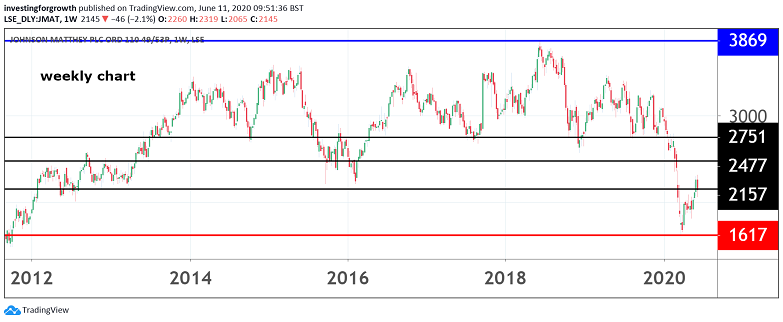Reaction to Johnson Matthey results and dividend cut
Halving the dividend improves further its financial position, but our head of markets reports concerns.
11th June 2020 10:21
by Richard Hunter from interactive investor
Halving the dividend improves further its financial position, but our head of markets reports concerns.

Inevitably, the pandemic has had its say in Johnson Matthey (LSE:JMAT) full-year results, but there are wider issues which continue to overhang the company’s prospects.
The closure of car manufacturing plants resulting from Covid-19 has had an obvious impact, such as an increase in debtor provision as well as the reduction in revenues and the total hit to underlying profit is £60 million. Higher prices of precious metals have also led to a spike in the cost of borrowing and net debt remains noticeably high at around £1.1 billion.
Although revenues showed a healthy jump of 36% to £14.6 billion in the 12 months to 31 March, well above expectations, this did not feed through to the bottom line, where a pre-tax profit figure of £305 million was down 38% on the previous year and significantly light of market projections.

Source: TradingView. Past performance is not a guide to future performance.
The company’s financial position does provide some comfort overall, however, with access to liquidity of £1.3 billion accompanied by delivered cost savings of £120 million. A halving of the final dividend to 31.125p will also ease the load, while from a trading perspective the group is showing early benefit from China, with production recovering towards the levels of the previous year.
Johnson Matthey’s main Clean Air business, which accounts for 63% of group sales, has variable costs which are responsible for 75% of the total, thus giving flexibility in rather more testing times such as these.
Of broader concern is the eventual destination of the automotive industry and, in particular, whether the move to electric cars will become standard. This would all but destroy the traditional catalytic converter business and indeed filter emissions as a whole, although the possibility of a strong showing from the hybrid market in the years to come would be arguably the ideal outcome for the group.
This is partly because Johnson Matthey benefits from diversification. It has long recognised the warning signs of an evolving vehicle market, and its battery business, while in relative terms is still at a formative stage, is nonetheless showing promising signs of growth and revenue contribution.
- Stock market rally poll: too much too soon, or only the start?
- 10 stocks that pass four important dividend tests
- Take control of your retirement planning with our award-winning, low-cost Self-Invested Personal Pension (SIPP)
Within its New Markets division, there are other applications such as for e-bikes, while its expertise is also used for specialisms such as for medical device components.
Elsewhere, the Efficient Natural Resources unit houses catalyst technologies, whose applications range from the chemical to the oil and gas industries.
The Health division completes the jigsaw and, while there has been limited success of late due to a heavy reliance on a specific market segment, but the prospects for the unit are visible given the speed of technological advances, which is unlikely to slow.
Outside of Europe, Johnson Matthey’s presence in the geographies of Asia and the US, as well as its exposure to favourable environmental trends offer potential, but this needs to be translated into strong and sustainable growth.
The company has had a challenging year and the shares have reacted accordingly. A 31% decline in the share price compares with a drop of 14% for the wider FTSE 100 index, with a 22% dip in the last six months alone. Both the shorter and longer-term challenges leave the jury out on the company, where the market consensus remains a ‘hold’, albeit a strong one.
These articles are provided for information purposes only. Occasionally, an opinion about whether to buy or sell a specific investment may be provided by third parties. The content is not intended to be a personal recommendation to buy or sell any financial instrument or product, or to adopt any investment strategy as it is not provided based on an assessment of your investing knowledge and experience, your financial situation or your investment objectives. The value of your investments, and the income derived from them, may go down as well as up. You may not get back all the money that you invest. The investments referred to in this article may not be suitable for all investors, and if in doubt, an investor should seek advice from a qualified investment adviser.
Full performance can be found on the company or index summary page on the interactive investor website. Simply click on the company's or index name highlighted in the article.